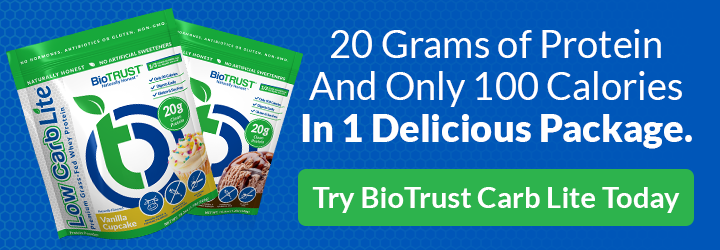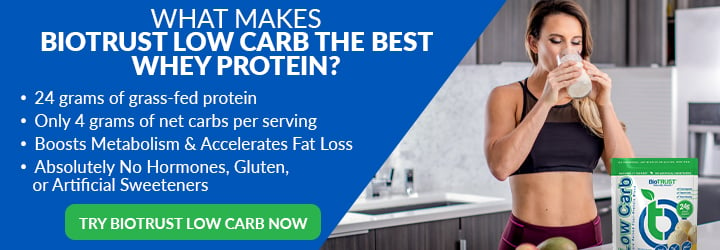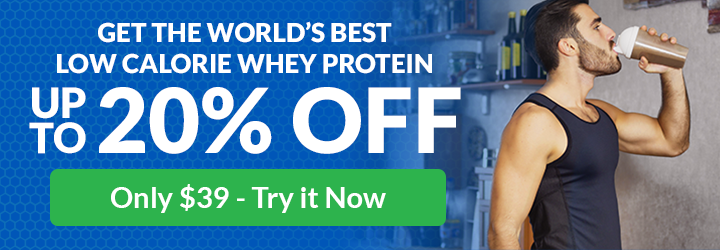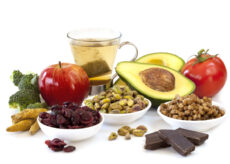Why Whey Protein Is a Must-Have for Women Over 50
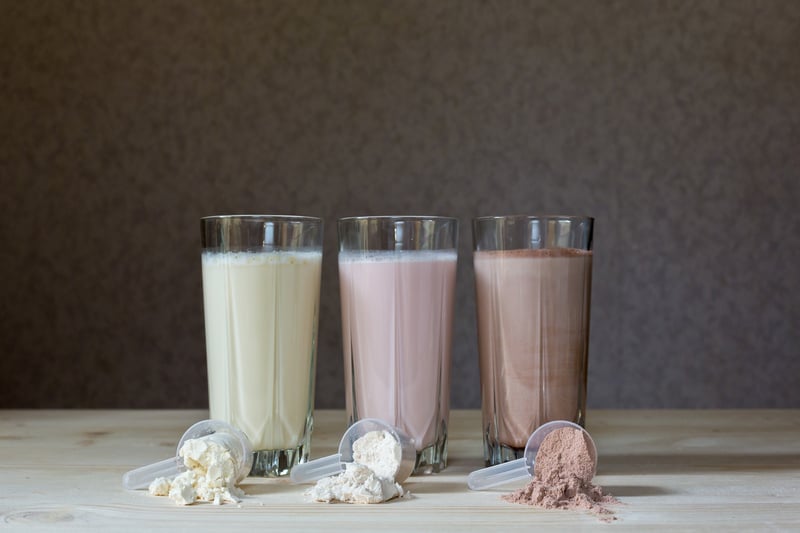
There are two types of people in the world. Those who know whey as what Little Miss Muffet was eating when she was rudely interrupted by a spider, and people who are seeking an easy way to get more protein in their diets. (Or, perhaps, that’s what Little Miss Muffet was doing and the spider had the same goal? We’ll never know…)
Of course, whey protein is popular with the muscle-building crowd like bodybuilders, athletes, and fitness models. This is because when it’s combined with weight training, it’s been shown to promote muscle protein synthesis (leading to new muscle growth and strength increases). But it’s also popular with several other crowds due to its range of benefits. That includes more mature women and men as they strive to maintain or gain strength.
Here are a few reasons why whey protein is a must-have for women (and men) as they age. But first…
What is Whey Protein?
Whey protein is one of the two main proteins found in milk. (Casein is the other.) When cheese is made, the casein forms the cheese curd, which also contains most of the milk fat. Whey is the watery liquid leftover. If you’ve ever opened a container of yogurt and found a liquid floating at the top of the creamy substance, that’s whey protein.
At one time, whey was just considered a byproduct that was tossed away as it wasn’t needed for cheese making. Now, though, we understand that whey protein is a high-quality protein that contains all nine essential amino acids. Whey contains several milk proteins, including beta-lactoglobulin, alpha-lactalbumin, bovine serum album, and immunoglobins. It’s also fairly low in lactose, so it’s often well tolerated by folks even if they usually have a hard time digesting milk. Plus, it’s low in fat, so it’s also lower in calories than many other milk (or protein) products.
Luckily, now that we understand the value, whey is no longer just tossed out as a byproduct. Instead, manufacturers take the liquid, pasteurize it to kill any bacteria, dry it, and create a powdered whey protein product that can be made into shakes, smoothie bowls, protein bars, and other higher-protein foods. And today, it stands as one of the most well-studied supplements available.
Whey Protein Types
Depending on the processing, whey is divided into concentrates, isolates, and hydrolysates, which have different characteristics and benefits. For instance:
Concentrates are used in protein drinks, bars, and other nutritional products and can vary widely depending on the brand when it comes to their protein, lactose, and fat content. They range from around 70 to 80% protein with some remaining fat, lactose, and other nutrients, and tend to taste the best.
Isolates are higher in protein (90%) while being lower in fat and lactose. However, some of the beneficial nutrients found in whey protein concentrates may be removed. They’re still typically found in protein supplements, including drinks and bars, and may be combined with concentrates or other types of protein powder. While they aren’t recommended for people with a dairy allergy, they can be suitable for people with lactose intolerance.
Hydrolysates are typically found in specialized formulas for infants or in medical products made to fight nutritional deficiencies. They’re the easiest to digest as they’re “pre-digested.” That is, the longer protein chains (peptides) are broken down into smaller chains. Because this type of whey protein is pre-digested, it’s also absorbed faster, which can create bigger insulin spikes (up to 28 to 43%). 1
Whey protein concentrate is often the most recommended as it’s priced more affordably, retains the most beneficial nutrients, and has the best flavor. That said, if you have a hard time digesting whey protein, then isolate or hydrolysate may be easier for you to tolerate.
Whey Protein Benefits for Women Over 50
So, why is whey protein a must-have for women over 50? Let’s count the ways:
1. It Helps You Build Muscle
As we age, we naturally lose muscle mass—unless we do something to prevent it. In fact, muscle loss is one of the most obvious signs of menopause, and it’s due, in part, to the natural decline in estrogen levels. 2 This loss of muscle mass can lead to:
- Numbness or tingling in the limbs
- Decreased balance
- Weakness
- Increased risk of falls
- And gradual loss of memory.
Muscles need both protein (ideally from complete sources like whey) and resistance (such as weight training) to remain strong as we get older. While consuming enough protein in general is good, whey protein in particular may be even better as it provides branched-chain amino acids, including leucine. It also is one of the best sources of cysteine. These amino acids are perhaps the most important for boosting muscle growth. 3, 4
2. It May Help You Lose Body Fat
Eating a higher protein diet has been found to help reduce hunger, which helps you eat less. 5 That means you consume fewer calories, which can lead to weight loss. Protein can also help boost metabolism, so you burn more calories even when you aren’t exercising. Whey protein makes it easy to eat more protein. 6
But there’s more… According to one 12-week study with obese participants who decreased calorie intake by 500 calories per day, both groups lost weight. However, those using a whey protein supplement lost slightly more weight. More importantly, the whey protein group lost significantly more body fat than the control group and maintained more of their lean mass. 7
Other research found that when other calories were replaced with whey protein in people who lifted weights, they lost around eight pounds while gaining muscle. 8 Win-win!
3. It May Support Healing and Muscle Recovery
Perhaps surprisingly, the body uses the amino acids in whey protein to help repair skin from injury or even surgery. 9 Whey’s also been found to help support muscle recovery after exercise. 10
4. It May Help Protect Against Disease
While more research is needed, initial (often animal) research has found promising effects of whey protein concentrate when battling diseases like cancer, hepatitis, HIV, heart disease, and others. 11 – 15
5. It Provides a Big Boost of Nutrition
If you’ve lost a lot of weight due to illness or injury, it’s important to provide your body with the nutrients and building blocks needed to build back better. A whey protein supplement can help by supplying the needed amino acids, especially for those who struggle to get enough protein from whole foods due to a diminished appetite or difficulty chewing or swallowing.
6. It May Help Improve Health Markers
Concerned with your cholesterol levels? Whey protein may help. In one smaller study with overweight men and women, after 12 weeks of using whey protein, participants saw decreased levels of total and LDL cholesterol compared to a group using casein protein. 16
Other research found that when people with hypertension supplemented with a whey protein product, it helped them better manage blood pressure. 17
These changes could help decrease the risk of heart disease and stroke. 18 Whey protein concentrate in particular, when consumed 30 minutes before a full meal, was shown to improve lipid profiles and fasting blood sugar over a 12-week study. 19
What to Watch for in Whey Protein Products
With so many benefits, you may want to rush out and find any old inexpensive whey protein to add to your diet. Hold on. Not all whey products are created equal. Some are made with added sugar (some even list sugar as the first or second ingredient). Others are loaded with processed ingredients like artificial flavors, sweeteners, and additives. This can take a perfectly wonderful ingredient and quickly turn it into a useless product that can even lead to increased weight gain (and we’re not talking about muscle gain).
As with any product, make sure you read through the list of ingredients to ensure it contains only the ingredients you want with natural, low-calorie sweeteners. Also, make sure your product comes from a reputable manufacturer that provides quality third-party (independent) testing to ensure the product doesn’t contain contaminants or fillers.
As long as you’re consuming moderate amounts of whey protein, this should also help prevent any digestive complaints, such as constipation, diarrhea, stomach pains or cramps, or nausea from consuming lower quality whey protein products. That is, unless you have a milk allergy or are consuming too much at one time.
Is Whey Protein a Must-Have?
Protein is an essential nutrient no matter what your age or gender, but it may be even more beneficial for women over 50. Many of us simply don’t get enough quality protein in our diets.
Whey protein is one of the most popular protein sources due to its wide range of benefits and abundant research. It’s also notably better than some other options as it provides all of the essential amino acids, including branched-chain amino acids to help support strong, healthy muscles. It’s also easy to digest and fast absorbing. Sure, you could get protein from other sources, but few have as much proven performance as whey.

